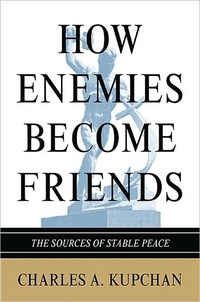

Purchase
The Sources of Stable Peace
Princeton University Press
February 2010
On Sale: February 14, 2010
448 pages
ISBN: 0691142653
EAN: 9780691142654
Hardcover
Add to Wish List
Non-Fiction
Is the world destined to suffer endless cycles of conflict
and war? Can rival nations become partners and establish a
lasting and stable peace? How Enemies Become Friends
provides a bold and innovative account of how nations escape
geopolitical competition and replace hostility with
friendship. Through compelling analysis and rich historical
examples that span the globe and range from the thirteenth
century through the present, foreign policy expert Charles
Kupchan explores how adversaries can transform enmity into
amity--and he exposes prevalent myths about the causes of peace. Kupchan contends that diplomatic engagement with rivals, far
from being appeasement, is critical to rapprochement between
adversaries. Diplomacy, not economic interdependence, is the
currency of peace; concessions and strategic accommodation
promote the mutual trust needed to build an international
society. The nature of regimes matters much less than
commonly thought: countries, including the United States,
should deal with other states based on their foreign policy
behavior rather than on whether they are democracies.
Kupchan demonstrates that similar social orders and similar
ethnicities, races, or religions help nations achieve stable
peace. He considers many historical successes and failures,
including the onset of friendship between the United States
and Great Britain in the early twentieth century, the
Concert of Europe, which preserved peace after 1815 but
collapsed following revolutions in 1848, and the remarkably
close partnership of the Soviet Union and China in the
1950s, which descended into open rivalry by the 1960s. In a world where conflict among nations seems inescapable,
How Enemies Become Friends offers critical insights for
building lasting peace.
Comments
No comments posted.
Registered users may leave comments.
Log in or register now!
| 


 © 2003-2025 off-the-edge.net
all rights reserved Privacy Policy
© 2003-2025 off-the-edge.net
all rights reserved Privacy Policy